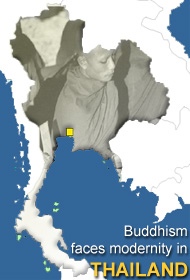Unity in Buddhism is a distant hope
By METTANANDO BHIKKHU, Bangkok Post, April 22, 2005
Thai Prime Minister Thaksin Shinawatra wants to bring Buddhists closer together, but factionalism appears too strong
Bangkok, Thailand -- The prime minister wants to see the launch of an International Visakha Puja. Thaksin Shinawatra expressed his hope on his weekly radio show on April 16, six days after the nationwide merit-making ceremony on April 10 in which all five major religions in Thailand simultaneously performed rituals aimed at bringing peace to the country.
 Mr Thaksin said he hoped to be able to bring together the different Buddhist groups and fragments in Thailand to work in harmony for the religion and country.
Mr Thaksin said he hoped to be able to bring together the different Buddhist groups and fragments in Thailand to work in harmony for the religion and country.
Visakha Puja marks the birth, enlightenment and passing of the Buddha, which falls each year on the full moon day of May or June, according to the lunar calendar of Theravada Buddhism. It will be celebrated this year on May 22.
Many Buddhists welcome the initiative. But, curiously, it was frowned upon by the Ecclesiastical Council, the monks' ruling body, as soon as the name Chamlong Srimuang was announced as a leader of the celebration's organising committee.
On April 10, members of the Council voted unanimously to boycott Santi Asoke, the puritanical reformist Buddhist community to which Maj-Gen Chamlong, currently director of the National Centre for the Promotion of Morality, is a devoted member. The group was excommunicated by the Council in 1989
It is noteworthy that while the Council is willing to extend its hospitality to Buddhists from the Mahayana tradition, whose adherents are found in Tibet, China, Vietnam, Mongolia and Japan, to take part in the Visakha celebration, the door is closed to Santi Asoke. Their conflicts run too deep.
The orthodoxy of Theravada Buddhism has been the life and soul of the management of the Ecclesiastical Council of Thailand since its very beginning. The Council was founded to maintain the purity of the precepts and practices of all monks as expounded by the Buddha in the Pali canon.
In 1989, the founder of Santi Asoke, Phra Pothirak, was accused by the Ecclesiastical Council of violating the Ecclesiastical Law and of straying from Theravada orthodoxy. He was arrested as a result, but the courts imposed a token fine and set him free.
Phra Pothirak, who openly declared himself an enlightened person, took to wearing white garments over his robes so he could not be arrested for impersonating a monk; a habit he maintains to this day even though the constitution allows members of the community to follow the faith of their preference.
Despite the excommunication, Santi Asoke is growing more popular among Thai people who perceive its followers as austere Buddhists who are truthful to their faith. It is also helped by the scandals involving corruption and the abuse of power by senior orthodox monks which have shaken the faith of the Thai public.
While the Ecclesiastical Council can never give in to the prime minister's proposal to work with Santi Asoke, Maj-Gen Chamlong is also unlikely to give in and will probably threaten to withdraw entirely from the project.
The Sangha Council's authoritarian ways are endorsed by the Ecclesiastical Law of 2505 BE (1962), issued during the dictatorship of Field Marshal Sarit Thanarat.
This was a huge setback for the development of Buddhism in Thailand. For example, the top structure of the Council follows that of the military, with four patriarchs listed as candidates for accession to Supreme Patriarch. Membership of the Council is for life, regardless of advanced age or illness. The patriarchs tend to be highly conservative and suspicious of other faith groups. Although well-versed in rituals, they are often criticised as lacking in management skills and an interest in social problems.
Many monks complain of being trapped in a closed, feudalistic system. Just as an example, monks are barred from receiving a passport directly from the government and they must receive permission to travel abroad, which often takes several months.
Academics, social activists, lawyers and the media have tried over the past decade to suggest reforms, but they have failed at each attempt. In fact, the Ecclesiastical Law was amended in 1992, again a time of military rule, to prevent His Majesty the King from selecting candidates for the Supreme Patriarch. The most senior members of the Council, based on their years of service (not their seniority as monks as in the Theravada Buddhist monastic code) select the candidate for appointment by the King.
The top-down structure of the Ecclesiastical Council appears rock-solid. The law states they are not required to comply with demands for change.
Mr Thaksin may want to see senior monks patch up their differences with dissent groups - as he put it: ``We are all followers of the same Buddha'' - but given the Council's inflexibility which is reinforced by the Ecclesiastical Law, it is unlikely he will see his wishes fulfilled.
----------
Mettanando Bhikkhu is a staunch critic of the Sangha Council and a member of the ethics committee at Chulalongkorn University's Faculty of Medicine. He is a former physician with an MA from Oxford University and a doctorate from Hamburg University, Germany

 Mr Thaksin said he hoped to be able to bring together the different Buddhist groups and fragments in Thailand to work in harmony for the religion and country.
Mr Thaksin said he hoped to be able to bring together the different Buddhist groups and fragments in Thailand to work in harmony for the religion and country.